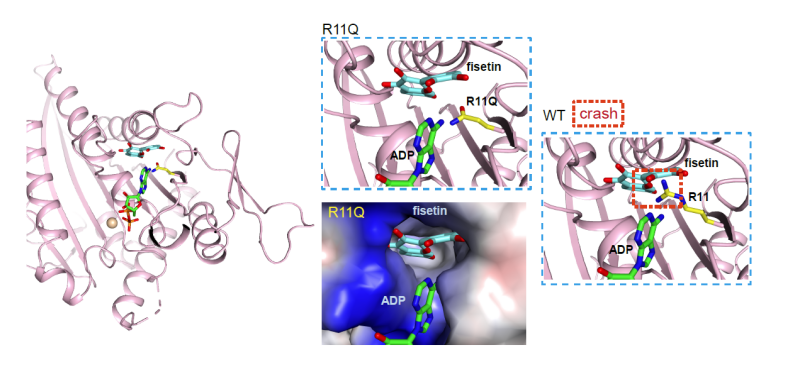
Mutations in the kinesin KIF1A cause impaired axonal transport, resulting in neurological disorders or neurodevelopmental disorders known as KIF1A-associated neurological disorder (KAND). In clinical practice, there is limited knowledge about effective interventions and treatments for these mutations.
The Caenorhabditis elegans serves as a valuable genetic model for studying KAND. Researchers led by Prof. FENG Wei from the Institute of Biophysics of the Chinese Academy of Sciences, together with Prof. OU Guangshuo from Tsinghua University, observed the effects of the KIF1A (R11Q) mutation in patients with comorbid autism spectrum disorder and attention-deficit/hyperactivity disorder.
They introduced the KIF1A (R11Q) variant into Caenorhabditis elegans homologous gene UNC-104, replicating the coordinated and locomotion impairments seen in KAND.
Structural analysis showed that this mutation is located near the ATP-binding pocket of the KIF1A motor domain, and the mutant nematodes exhibited behavioral incoordination. Genetic screening of the KIF1A (R11Q) mutant nematodes identified 20 mutations were identified that could correct the behavioral defects caused by this mutation.
In addition, in vitro experiments showed that two of these mutations partially restored the motor activity of KIF1A.
Based on this finding, the researchers further investigated whether there might be a small molecule with a similar rescue effect. By screening dietary supplements known to improve neurological health, they discovered that a plant flavonol called Fisetin could improve the locomotion and morphology defects caused by the KIF1A (R11Q) mutation, without affecting the wild-type KIF1A.
This study, published in PNAS, provides new insights into the treatment of KAND. The intervention of the small molecule Fisetin helps to enhance the activity of the pathogenic KIF1A variant, potentially improving symptoms associated with KAND.
Although the experiments showed that Fisetin had no significant effect on the motor kinetics of wild-type KIF1A in vitro and in vivo, we strongly recommend that medical professionals or specialists in the field of neurodevelopmental disorders be consulted before initiating any Fisetin supplementation for KAND patients, according to the researchers.

Structural model of Fisetin docking into the ATP-binding pocket of the KIF1A(R11Q) mutant (Image by FENG Wei's group)

86-10-68597521 (day)
86-10-68597289 (night)

52 Sanlihe Rd., Xicheng District,
Beijing, China (100864)

